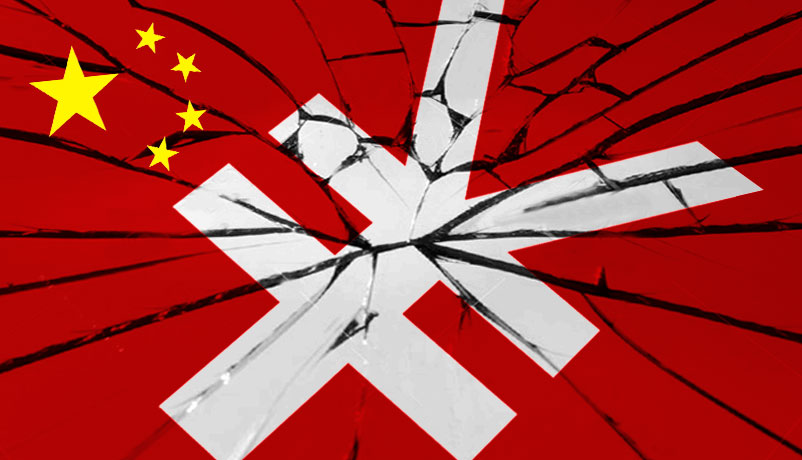Forget the #SensexCrash: China's crisis may actually be good for India

The crisis
- China\'s currency devaluation wasn\'t just an adjustment to a free yuan
- It was aimed at boosting exports
- China had oversold the economy for all these years
- It made excessive investment in infrastructure in the run-up to the 2008 Olympics
- China tried to defeat the economic slump by exporting its way out of trouble
Opportunity for India
- Boosting consumption is the only way this crisis can be overcome
- There is no country better suited than India, given its large mass of consumers
- This is a good chance to boost manufacturing, perhaps through Make in India
- The capital being taken out of China could find its way into India
The Chinese devaluation was not simply an "adjustment to a free yuan" as the Chinese cleverly tried to project. But surprisingly, even the IMF and our own economic advisor bought this argument.
The crash
As I had argued in my previous article, the fallout was likely to be to be highest in asset markets as finance capital moves at the speed of light because of high frequency trading.
It was clear that the Chinese had oversold the economy with excessive investment in infrastructure. This was largely driven by the build up to the Olympics in 2008 when the Chinese were buying metals with a vengeance.
The impending trouble in China was temporarily masked by the failure of the asset markets in the USA, the world's largest market. This in turn caused a world recession, which has been on and off since then.
As the US, Japan and other markets have shown signs of recovery, the Chinese cleverly tried to "export their way out of trouble" caused by insufficient global demand. Unfortunately, this sent the signal that the Chinese economy was in trouble and the stock market crashed.
This led investors to build up their cash balances by liquidating stocks elsewhere. The final result of this was the "manic Monday" we saw on 24 August.
Questions
A number of questions arise. First, Is the world again headed for a recession? Here the answer is a categorical no for two reasons.
First, according to the WTO, the Chinese accounted for about 10% of world imports (and hence world demand) in 2012 and a drop in this cannot trigger a world recession.
Chinese demand is significantly higher for primary commodities such as tin, steel and oil. Hence producers of primary commodities like Latin America, Australia and the OPEC countries are in for a bad time.
Chinese accounted for 10% of world imports, and hence demand, in 2012. A drop in this cannot trigger a recession
Second, demand for final consumer goods is driven more by countries like the USA and other OECD countries and GDP growth in these countries has seen significant change since 2010.
Thus markets of the USA, Japan and the UK have been growing at 2-3% between 2010-2014 which, given the high base, represents a substantial addition to world consumer demand. At the same time, there are emerging economies like India, Vietnam and the Philippines which have grown at a healthy 6-7% during the same period.
Hence, the two classical signs of a depression - persistent two quarter fall in world outputs and prices - are not visible. What is more likely is a structural adjustment in world production as the primary commodity markets take a hit. Producers of services and agricultural goods are unlikely to be hit as badly.
Impact on markets worldwide
A second question relates to the impact on world financial markets. The world is littered with carcasses of stock market analysts who tried to predict stock market crashes. However, as I have argued earlier, what we are seeing is an adjustment as investors move out of the Chinese market and relocate elsewhere.
After the initial fall, it is likely that financial capital would find its way out of China into other markets. While speculators in stock and real estate markets are likely to lie low for a while, it is unlikely that genuine long term investors will incur the kind of losses that were seen after 2008.
Impact on India
It seems capital will find its way into safe havens like the US bond market where bond prices will fall and yields will go up. Some of this capital (called FII capital) may also come into the Indian stock market, which should recover to a large extent in the coming week. Since it is this FII flow which largely determines the value of the rupee, the rupee may well revert to the earlier Rs. 63-64/$ level.
A third question relates to the impact on India. If investors move out of China, where would they go? It is argued that India is not the only option. I disagree.
The recovery of the world economy will depend on the expansion of demand. This requires consumers. Outside China, the largest mass of consumers is only in India.
In fact, this might well be the time to make a push for expanding production in India - perhaps a renewed push to Make in India.
We need to see whether Indian authorities concentrate on FDI or the stock market.
Boosting consumption the only way out
The bottom line is that the world needs consumption led growth (as John Maynard Keynes had argued). The shortfall in demand worldwide is clear from the fact that international growth in exports lags behind growth in GDP.
Part of the reason for the stagnant consumption is the stagnant demographic growth in almost all the developed countries, barring USA.
China has also not helped matters by building up enormous foreign exchange reserves. The Chinese have been selling but not buying in the world market.
With persistent foreign exchange reserves of over $3 trillion - about 25% of world reserves - the Chinese have been in effect withdrawing potential dollar demand from the world market. Will they change? And are the Americans watching? Only time will tell.
The views expressed here are personal and do not necessarily reflect those of the organisation.
First published: 25 August 2015, 8:59 IST





![BJP's Kapil Mishra recreates Shankar Mahadevan’s ‘Breathless’ song to highlight Delhi pollution [WATCH] BJP's Kapil Mishra recreates Shankar Mahadevan’s ‘Breathless’ song to highlight Delhi pollution [WATCH]](http://images.catchnews.com/upload/2022/11/03/kapil-mishra_240884_300x172.png)

![Anupam Kher shares pictures of his toned body on 67th birthday [MUST SEE] Anupam Kher shares pictures of his toned body on 67th birthday [MUST SEE]](http://images.catchnews.com/upload/2022/03/07/Anupam_kher_231145_300x172.jpg)






